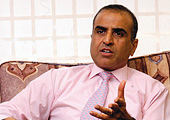 |
| Television Eighteen Group's Bahl: More
than just news |
Pimp
my ride and your Stocks are two unlikely TV shows to be coming
out of the same production house but last fortnight, when Raghav
Bahl's Television Eighteen (TV18) Group struck a 50:50 joint venture
with Viacom, the stage was set to become big enough to accommodate
trading strategies as well as pop culture. The JV with the US
media conglomerate, however, will provide Bahl with multiple platforms
across the entire spectrum of general entertainment (not just
music and in fact not just restricted to television). The venture
will be through Global Broadcast News (GBN), the group's subsidiary
that currently operates news channels CNN-IBN and ibn7. Viacom
18 will straddle film and television across a range of brands.
The partnership will also encompass Viacom's existing TV channels
in India, namely MTV, vh1 and Nickelodeon. A Hindi general entertainment
channel is also in the pipeline. "We are making investment
in the JV through GBN. It has fund-raising plans for this purpose,"
says Haresh Chawla, Group CEO, TV18. GBN has already announced
plans to raise up to $200 million (Rs 820 crore).
For Bahl, Viacom 18 is his third big global partnership. In
1994, TV18 slipped into an alliance with NBC Universal, as a result
of which it today has under its banner two business news channels,
CNBC TV18 and CNBc Awaaz. And last year, through GBN, the group
launched CNN-IBN, a mainstream news channel, in partnership with
Time Warner Inc. In early 2006, it acquired Channel 7, a Hindi
news channel, and rebranded it ibn7. "The new venture is
a homecoming of sorts for us. Before we focussed our energies
on news, we used to produce shows for channels, including MTV
in the early 90s. Today, the day has come when we re-ignite our
entertainment genes with Viacom 18," says the Managing Director
of the TV18 Group.
Bahl, for his part, has been pretty busy of late. Recently,
he tied up with Virgin Comics to publish graphic novels and co-produce
movies. In fact, cinema is proving to be pretty close to his heart.
The group's motion pictures operation, Studio 18, has several
projects in the pipeline and after the projects are completed,
the motion pictures business will be moved into the venture with
Viacom. The group's holding firm, Network 18 Fincap, has also
taken a 9 per cent stake in the Indian Film Company-sponsored
by Bahl, the founder and promoter of TV18 Group-worth $10 million
(Rs 41 crore). This company, which is in the process of being
listed on the Alternative Investment Market (AIM) of the London
Stock Exchange, will acquire rights of films and market it via
theatres in domestic and overseas markets, besides using other
routes like satellite TV and DVD rights. Apart from this, it will
finance films and enter into co-production tie-ups with directors.
Beyond movies, Bahl has also spread himself thick in the digital
space under Web 18, where he has acquired portals such as Crisil
Marketwire, Poweryourtrade.com and Commoditiescontrol.com. According
to company insiders, the group is also gearing to launch a financial
daily, a business magazine, and foray into media process outsourcing.
Even as it stands today, The TV18 Network appears to be in a
league of its own, with more ammunition than even Rupert Murdoch's
star Network. It has two business channels, two news channels,
two music channels (MTV and VH1), a kids' channel (Nickelodeon),
and a Hindi general entertainment channel that's on its way. star
Network, on the other hand, has star Plus, star One (its second
Hindi general entertainment channel), star Movies, star World
(English Entertainment), star Gold, star Vijay (Tamil), ESPN,
star Sports, Channel V (Music), star News, star Ananda (Bengali
News), Nat Geo Adventure, National Geography and History. What's
more, GBN, in just two years, commands a valuation of Rs 2,000
crore (it got listed in February 2007). And flagship TV18 itself
has hit a market cap of $1 billion (Rs 4,100 crore), a feat none
of its peers appears likely to outdo in the near future.
A Hero
Comes Along
UTV's Screwvala is emerging the leading
man of Bollywood.
 |
| UTV's Screwvala: Going global |
If Raghav Bahl is hogging
the media and entertainment space, Ronnie Screwvala prefers to
confine himself to entertainment-where he's got a lot going, right
from movies to gaming, and from animation to software production.
And broadcasting is next on the anvil. Screwvala, Chairman &
Managing Director, UTV Software, who in 2006 offloaded a 14.9
per cent stake in the company to Walt Disney, is now looking to
unlock the value that's bursting at the seams of his movie business.
He's formed UTV IOM Inc., a 100 per cent subsidiary that's incorporated
in Mauritius, which will be listed on the London Stock Exchange's
aim. The entire movie operations have been moved into this subsidiary.
"A nasdaq listing would have been time-consuming and listing
at London made geographical sense," says Screwvala. UTV IOM
Inc. will be listed on aim in 1-2 months and is expected to raise
$70-75 million (Rs 287-307.5 crore) by diluting 25 per cent of
its equity.
In the last two years, UTV has released 18 films, which would
explain why almost two-thirds of UTV's total revenues of Rs 179
crore in March year end 2006, came from films-Rs 103.3 crore.
For the year ended March 2007, the company raked in a turnover
of Rs 56 crore from movies alone. The total revenues of the company
during this year was Rs 152 crore. According to a report by Prabhudas
Liladhar, a Mumbai-based broking firm, UTV has films with a budget
of Rs 466 crore lined up for the next two years. Lights, camera,
action.
-Anusha Subramanian
Global Medicine
Sun Pharma inches closer to becoming an Indian
multinational.
 |
| Sun's Shanghvi: Shining bright |
Around three months ago,
the promoters of Taro Pharmaceutical Industries put the generics
giant on the block. Three bidders threw their hat into the ring.
The winner emerged last fortnight: Sun Pharmaceuticals, which
agreed to buy the Israel-headquartered company for $454 million
(Rs 1,861.4 crore). What might have kept prospective acquirers
away and perhaps resulted in conservative offers from the other
two in the fray is a huge loss Taro is expected to show for 2006
(the financial numbers have still not been declared; in 2005,
Taro posted a $5.7 million profit after tax on revenues of just
under $300 million).
For Dilip Shanghvi, Chairman & Managing Director, Sun Pharma,
that blob of red isn't much of a concern. "We expect to be
EPS (earnings per share) accretive within 12-18 months. "The
acquisition helps us in getting into the dermatology business,
in addition to giving us access to existing and new products,"
says Shanghvi. In a recent report, DSP Merrill Lynch states that
the deal makes strategic sense, and the price tag is fair. "In
our view, the deal valued at 1.5X sales is a reasonable transaction...
It offers Sun significant scale, several niche dosages and allows
significant scope for synergies…"
An irritant for Shanghvi is that Taro's minority shareholders,
Franklin Advisers Inc. and Templeton Asset Management, who control
9 per cent of the company, have filed a motion in the Tel-Aviv
District Court. Their contention is that this deal will discriminate
against minority shareholders. Shanghvi counters that the deal
is in the best interest of shareholders. Sun will fund the all-cash
acquisition through internal accruals and the proceeds from a
recent $350 million (Rs 1,435 crore) FCCB issue. Today, around
40 per cent of Sun's revenues come from overseas markets. "Following
the acquisition of Taro, we expect that to grow to 65 per cent,"
adds Shanghvi. Now here's another Indian multinational in the
making.
-Krishna Gopalan
Winner in Wireless
Bharti Airtel gate-crashes into the 40 m
subscriber league.
 |
| Airtel's Mittal: King of the wireless
village |
In the world's fastest
growing wireless market, milestones come thick and fast. The newest
landmark has to do with Bharti Airtel gate-crashing into the 40
million subscriber club; it now claims to be in the league of
the top 10 wireless companies in the world that have 40 million
or more mobile subscribers each from a single country. A caveat:
Bharti Airtel claims to have entered the top 10 with 40 million
subscribers as of May 21, although data for the other companies
on that list for the same period is not available for comparison.
Yet, the significance of Airtel rubbing shoulders with global
giants like China Mobile, AT&T Wireless and NTT DoCoMo is
not lost on market observers. "In terms of network and quality
of service, Airtel has led the Indian industry to be as good as
China's or any other Asia-Pacific markets. Despite the fact that
Indian operators face largely price-sensitive subscribers and
continued pressure on ARPUs (Average Revenue Per User), they have
managed to take the mobile market to over 170 million in 12-13
years," says Romal Shetty, Director (Telecom), KPMG. "In
the last 2-3 years, we have made significant investments in infrastructure;
we have been spending $1.5 billion (Rs 6,150 crore) every year
on the network. This year our investment on the network would
be $3-3.5 billion (Rs 12,300-14,350 crore) of which 70 per cent
will go into mobile services," says Sanjay Kapoor, President
(Mobile Services), Bharti Airtel.
Significantly, Airtel added its last 20 million subscribers
in only 13 months compared to the 11 years it took to add its
first 20 million. India added about 65 million mobile subscribers
in 2006-07 with Airtel alone contributing about 18 million. While
the industry has notionally set itself the ambitious target of
reaching 500 million mobile subscribers by end-2010, Airtel is
expected to take its number to 125 million in the same period
even though the company refuses to make any forward looking statements.
Harit Shah, telecom analyst at Angel Broking, says both numbers
are achievable. "Our assessment is that Airtel would easily
reach 110 million by end-2010," he adds.
-Kapil Bajaj
|








